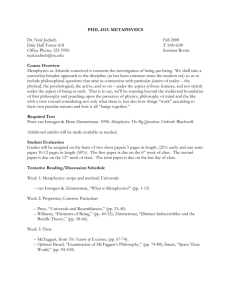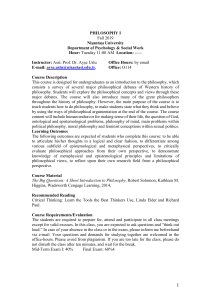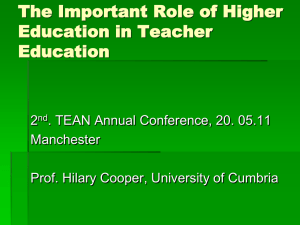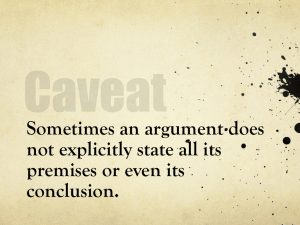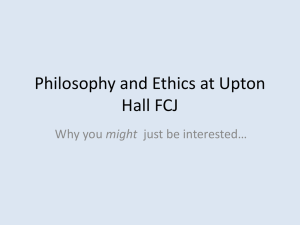iii. political philosophy
advertisement
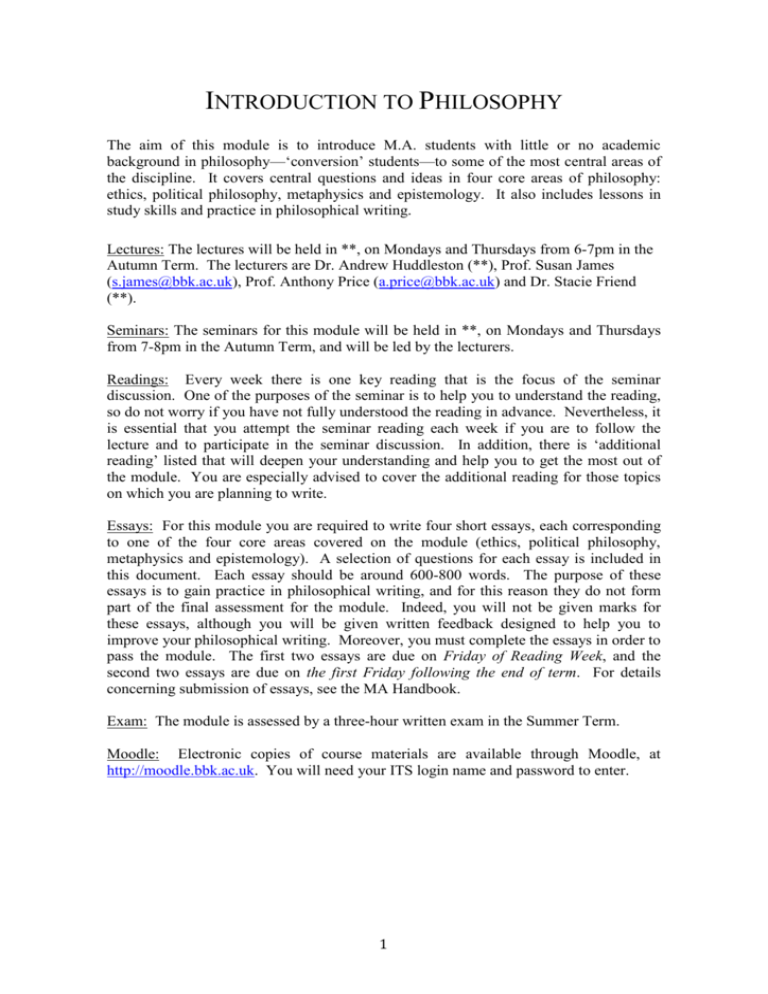
INTRODUCTION TO PHILOSOPHY The aim of this module is to introduce M.A. students with little or no academic background in philosophy—‘conversion’ students—to some of the most central areas of the discipline. It covers central questions and ideas in four core areas of philosophy: ethics, political philosophy, metaphysics and epistemology. It also includes lessons in study skills and practice in philosophical writing. Lectures: The lectures will be held in **, on Mondays and Thursdays from 6-7pm in the Autumn Term. The lecturers are Dr. Andrew Huddleston (**), Prof. Susan James (s.james@bbk.ac.uk), Prof. Anthony Price (a.price@bbk.ac.uk) and Dr. Stacie Friend (**). Seminars: The seminars for this module will be held in **, on Mondays and Thursdays from 7-8pm in the Autumn Term, and will be led by the lecturers. Readings: Every week there is one key reading that is the focus of the seminar discussion. One of the purposes of the seminar is to help you to understand the reading, so do not worry if you have not fully understood the reading in advance. Nevertheless, it is essential that you attempt the seminar reading each week if you are to follow the lecture and to participate in the seminar discussion. In addition, there is ‘additional reading’ listed that will deepen your understanding and help you to get the most out of the module. You are especially advised to cover the additional reading for those topics on which you are planning to write. Essays: For this module you are required to write four short essays, each corresponding to one of the four core areas covered on the module (ethics, political philosophy, metaphysics and epistemology). A selection of questions for each essay is included in this document. Each essay should be around 600-800 words. The purpose of these essays is to gain practice in philosophical writing, and for this reason they do not form part of the final assessment for the module. Indeed, you will not be given marks for these essays, although you will be given written feedback designed to help you to improve your philosophical writing. Moreover, you must complete the essays in order to pass the module. The first two essays are due on Friday of Reading Week, and the second two essays are due on the first Friday following the end of term. For details concerning submission of essays, see the MA Handbook. Exam: The module is assessed by a three-hour written exam in the Summer Term. Moodle: Electronic copies of course materials are available through Moodle, at http://moodle.bbk.ac.uk. You will need your ITS login name and password to enter. 1 I. ETHICS Mondays, Weeks 1-5 During the course of these five weeks we will introduce you to some of the major issues in moral philosophy. We start from the questions of what is good for us and what makes our lives go well. We then consider the question of how our own good is related to the good of others; how we should choose between different people when goods conflict; and how we should think about end of life decisions. We round up by considering the question of whether ethical questions have true, correct, or objective answers. Preliminary Reading: Russ Shafer-Landau (ed.), Ethical Theory: An Anthology (Oxford: Blackwell, 2007). This collection contains a wide range of contributions to the topics discussed in this course, including some of the set readings. Week 1: What is good for us? Fred Feldman, ‘The Good Life: A Defence of Attitudinal Hedonism’, Philosophy and Phenomenological Research 65, 605-27; reprinted in Russ Shafer-Landau (ed.), Ethical Theory: An Anthology (Oxford: Blackwell, 2007), 294-305. Study Skills Session: How To Read Philosophy Week 2: What about the good of others? Philippa Foot, ‘Morality as a System of Hypothetical Imperatives’, The Philosophical Review 81 (1972), 305-15; reprinted in Russ Shafer-Landau (ed.), Ethical Theory: An Anthology (Oxford: Blackwell, 2007), 153-159. Week 3: How should we choose between the lives of different people? Judith Jarvis Thomson, ‘Killing, Letting Die, and the Trolley Problem’, in her Rights, Restitution and Risk (Cambridge: Harvard University Press, 1986), pp. 78-93; reprinted in Russ Shafer-Landau (ed.), Ethical Theory: An Anthology (Oxford: Blackwell, 2007), 590-599. Week 4: How should we think about death and dying? Allen Buchanan, ‘Advance Directives and the Personal Identity Problem’, Philosophy and Public Affairs 17 (1988), 277-302; reprinted in John Harris (ed.), Bioethics (Oxford: Oxford University Press, 2001), 131-154. 2 Week 5: Is there a right answer? Ronald Dworkin, ‘Objectivity and Truth: You'd Better Believe It’, Philosophy & Public Affairs 25 (1996), 87–139. Questions for the First Formative Essay (Ethics): 1. What role does pleasurable experience play in a good human life? 2. Could there be a perfectly rational egoist? If not, why not? If so, so what? 3. ‘Where many human lives are at stake, it is always right to save the greatest number.’ Discuss. 4. Is there an ethically significant difference between active and passive euthanasia? If not, why not? If so, why does it matter? 5. ‘To say that there is no right answer to moral questions is not simply false, it is immoral.’ Discuss. II. EPISTEMOLOGY Thursdays, Weeks 1-5 Week 1: What is knowledge? Edmund Gettier, “Is Justified True Belief Knowledge?,” Analysis 23 (1966). Linda Zagzebski, “The Inescapability of Gettier Problems,” Philosophical Quarterly 44:174 (1994). Week 2: Skepticism Descartes, Meditations on First Philosophy, Meditations 1 and 2 (various editions, including online: http://www.wright.edu/~charles.taylor/descartes/mede.html) G.E. Moore, “Proof of an External World,” in his Philosophical Papers (Allen & Unwin, 1959). Reprinted in Epistemology: An Anthology, ed. Jaegwon Kim and Ernest Sosa (Blackwell, 2000). Week 3: Relativism Paul Boghossian, Fear of Knowledge, (Oxford, 2006), p. 1-9, 58-94. 3 Study Skills Session: How to Write a Philosophy Essay Week 4: Peer disagreement Thomas Kelly, “The Epistemic Significance of Disagreement,” Oxford Studies in Epistemology, ed. John Hawthorne and Tamar Gendler (Oxford, 2005). May be available at: https://www.princeton.edu/~tkelly/esod.pdf Optional secondary reading: Jennifer Lackey, “What Should We Do When We Disagree?” Oxford Studies in Epistemology, ed. John Hawthorne and Tamar Gendler (Oxford, 2008).May be available at: http://faculty.wcas.northwestern.edu/~jal788/documents/WhatShouldWeDoWhenWeDis agree--OSE.pdf Week 5: The value of truth (and knowledge) Jane Heal, “The Disinterested Search for Truth,” Proceedings of the Aristotelian Society 88 (1987). Optional secondary reading: Paul Horwich, “The Value of Truth,” Nous 40:2 (2006). Questions for the Second Formative Essay (Epistemology): 6. Can it ever be a matter of luck that one knows something? 7. Do you know that this question contains nine words? 8. Can the relativist about knowledge know that relativism about knowledge is true? 9. When faced with disagreement from an epistemic peer, how, if it all, should one adjust one’s beliefs? 10. Should I strive to have as many true beliefs as possible? If not, why not? READING WEEK 4 III. POLITICAL PHILOSOPHY Mondays, Weeks 6-10 We usually assume that the inhabitants of a particular piece of territory become a political community by virtue of the fact that they form or live in a state. But what is a state? And what is living in a state supposed to achieve? This section will introduce you to a series of central debates within political philosophy by examining a range of answers to these questions. Each class will be structured around the work of a historical author whose ideas continue to exert a significant influence on contemporary philosophical debate. I shall provide longer reading lists for each topic and reading lists for individual essays. Week 6: What is the state? Thomas Hobbes, Leviathan [many editions], Introduction and chs. 13-16. Additional reading: Quentin Skinner, ‘Hobbes and the Purely Artificial Person of the State’, Journal of Political Philosophy Philosophy 7(1999). There’s a revised version of this paper in Skinner, Visions of Politics vol. III (Cambridge University Press, 2002). Study Skills Session: How to Write an MA Dissertation in Philosophy Week 7: The state as a means to peace and security Thomas Hobbes, Leviathan [many editions] Chs. 17-19. Additional reading: Julie Cooper, ‘Vainglory, Modesty, and Political Agency in the Political Theory of Thomas Hobbes’, The Review of Politics 72 (2010), 241–269. Week 8: The state as a means to freedom Jean Jacques Rousseau, The Social Contract [many editions], Book I, ch. 6 – Book II, ch. 6. Additional reading: Sharon R. Krause, Civil Passions (Princeton University Press, 2008), ch. 5. Week 9: The state as a means to justice John Rawls, A Theory of Justice, Ch. 1, sections 1-4, ch. 2, sections 10-12. 5 Additional reading: Chantalle Mouffe, ‘Political Philosophy without Politics’, Philosophy and Social Criticism, 13.2 (1987). Week 10: The state as a means to exploitation Karl Marx, The Communist Manifesto Additional reading: Wendy Brown, ‘Suffering Rights as Paradoxes’, Constellations 7.2 (2002). Questions for the Third Formative Essay (Political Philosophy): 11. Explain and assess the distinction between a state and a government, as this is drawn by EITHER Hobbes OR Rousseau. 12. How far does Hobbes view peace as the fruit of fear? 13. Is Rousseau’s claim that the way to live freely is to live in accordance with the general will coherent? Is it defensible? 14. Will a just state, as Rawls envisages it, be a democratic one? If so, why? If not, why not? 15. Is the view that the state ought to uphold the common good intrinsically utopian? IV. METAPHYSICS Thursdays, Weeks 6-10 In these five weeks we’ll explore some of the central metaphysical questions that have occupied philosophers since ancient times. Each week we will consider a core problem, with our focus primarily on modern and contemporary answers to the questions addressed. The most basic question is: What is there? That is, what exists or is real? We start by focusing on the debate over the nature of properties, also called ‘universals’. Roses, balls and shirts may be red. It seems that they all share a property, redness. Does this mean that there is something – the universal redness – over and above the individual items that are red? If so, what sort of thing is it? We then turn to questions about causation, which concern not what things there are in reality, but how those things are connected. What does it mean for an event to be the cause of another? In week 3 we consider the implications of causality for human agency: If all the events in the universe are connected by deterministic cause-and-effect relations, is there any room left for freedom? In weeks 4 and 5 we look more closely at the nature of ourselves. What makes you the particular person you are, and the same person over time? Are you essentially 6 mental, physical or both? How can we explain the possibility of conscious experience in a physical world? Preliminary Reading: John Carroll and Ned Markosian, An Introduction to Metaphysics (Cambridge: Cambridge University Press 2010) – this textbook provides helpful introductions to the topics we address Week 6: Universals Bertrand Russell, ‘The World of Universals’, Chapter 9 of Problems of Philosophy (1912); reprinted in various collections and available online at http://www.gutenberg.org/ebooks/5827 Week 7: Causation David Hume, An Enquiry Concerning Human Understanding, Section 4 Part I and Section 7 Part II; available online in numerous places Week 8: Free will Peter van Inwagen, ‘The Incompatibility of Free Will and Determinism’, Philosophical Studies 27 (1975): 185-199 [available through the library website] Study Skills Session: How to Prepare for a Written Exam in Philosophy Week 9: Personal identity John Perry, ‘A Dialogue on Personal Identity and Immortality’, (Indianapolis: Hackett 1978); reprinted in John Perry and Michael Bratman (eds.), Introduction to Philosophy: Classical and Contemporary Readings 3rd Edition (Oxford: Oxford University Press 1999) and later editions [will be posted on Moodle] Week 10: Mind and body Thomas Nagel, ‘What is It Like to Be a Bat?’ Philosophical Review 83 (1974): 435450 [available through the library website] Questions for the Fourth Formative Essay (Metaphysics): 16. Do we need to invoke universals to explain the sense in which different particulars 7 have the same properties? 17. Is there more to causation than regular succession? 18. Is freedom compatible with determinism? 19. Is psychological continuity the right criterion of personal identity? 20. Can science ever fully explain consciousness? 8

